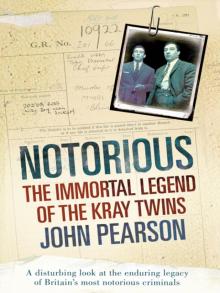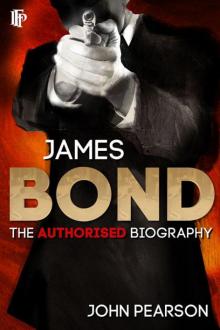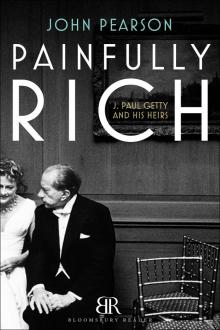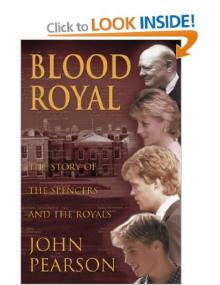- Home
- John Pearson
Painfully Rich Page 3
Painfully Rich Read online
Page 3
It used to be a commonplace of educational theory that teenage boys who read too much and were left to their own devices were particularly at risk to sexual temptation. This certainly applied to Paul, and the hearty discipline of the military school had failed to cure him. As something of a bookworm – he was known to his classmates as ‘Dictionary Getty’ – he had remained stolidly resistant to healthy group activities such as marching, field-days and team games of all types. The result was predictable. Together with his love of reading went an obsession with the opposite sex which stayed with him for life. In matters sexual he had finally discovered something he was good at.
Perhaps it was his manner, which was always courteous and charming with the other sex. (‘Paul never said “no” to a woman – or “yes” to a man,’ as somebody remarked.)
Or possibly it was simply knowing what he wanted, which in matters sexual, as in those of business, tends to bring results. At all events, by his fourteenth birthday Paul was apparently boasting of losing his virginity.
If true, this was more of an achievement for a boy from a rich Christian family in California than it would be today. By Getty standards, it was also seriously sinful, placing him on collision course with all those strictly held and practised puritan beliefs solemnly maintained by George and Sarah.
Paul was increasingly getting on his father’s nerves – and vice versa. A period supposedly studying economics at the University of Southern California at Los Angeles was followed by a further period supposedly reading law at Berkeley. But universities, it seemed, were not for him and as a thoroughly discontented seventeen-year-old, he soon returned to South Kingsley Drive.
By now Paul was very much his mother’s precious only child, the gift of God and a consolation for her deafness and advancing years. So rather than lose him totally, she schooled herself to overlook his faults, and tended to support him in his battles with his father.
As something of a bait – and a way of keeping him at home – Sarah arranged that he should have a private entrance for his room, with his own latch-key. It was typical of Sarah that, having done this, she was soon objecting to the friends he started bringing home, but there was little she could do about them – any more than she and George could really interfere with their son’s developing interest in the night life of Los Angeles.
Without telling them, Paul began borrowing his father’s car, an impressive four-door Chadwick tourer, which he would silently roll out of the garage when his parents were asleep and use to tour the local nightspots with his friends to pick up girls.
One night, after Paul had visited a roadhouse with companions Sarah would have disapproved of – and met some girls she would have disapproved of even more – disaster struck. One of the girls spilled red wine on the car’s upholstery, and although they did their best to mop it up, nothing could remove the stains.
When George saw what had happened, he must have realized the truth – that Paul was not just borrowing the family barouche for reasons of nocturnal pleasure, but indulging in his particular bête noire, the demon drink itself. But George’s reaction set an important precedent for future relations in the Getty family. No bellow of paternal rage disturbed the peace at South Kingsley Drive. As usual when it came to Paul, Sarah almost certainly restrained him, and not a word was said about the incident.
However, George had ways of registering paternal disapproval. The next time Paul tried borrowing the car when his parents were in bed, he found the back wheel firmly padlocked to a ring cemented to the garage floor.
When Sarah made the family migrate 2,000 miles south-west from frozen Minneapolis to radiant Los Angeles, this stretch of Southern California had yet to become the overpopulated paradise at the far end of the great American rainbow it is today. Its golden landscape was unsullied, its ocean unpolluted, and its perfect year-round climate was still unaffected by the products of the oil industry that was making George’s fortune.
The Gettys were early émigrés from the East in search of happiness – but even here happiness eluded them. The outdoor pleasures of the golden state were not for George and Sarah. As far as George the dedicated oilman was concerned, life still centred on the Oklahoma oilfields over 1,000 miles by railroad to the east. And Sarah found Los Angeles sadly deficient in culture and amenities. Thus it was very much in character that the house the couple built was more of a harking back to old world memories than a celebration of the new.
In his mid sixties Paul would finally succumb to buying himself a permanent home – the stately Tudor pile of Sutton Place. And here, among the orange groves off rural Wilshire Boulevard, was surely its precursor – the Tudor-style mansion with its mullioned windows, gimcrack gables, and freshly stained Elizabethan beams. As a house it presumably belonged to the distant world of another imagined Getty ancestor. Nostalgia was its keynote, and a few years later, when George felt rich enough to take Paul and Sarah off on their first extended holiday together, they travelled to Europe.
This was still the period when the heroes and heroines of novelists like Henry James and Edith Wharton were taking it for granted that only in Europe could they discover truly civilized existence. Europe, in those far-off days, was still the fountain-head of history, art, and serious sophistication for the American élite.
But this obsession with Europe was far more typical of East Coast millionaires than Californian nouveaux riches like George and Sarah. And it is interesting that at the very moment when expatriate New York movie-makers just up the road in the Hollywood hills were beginning a counterculture which would conquer Europe with a home-grown vision of America, the Gettys should have undertaken this laborious journey to New York, then on to Europe for a carefully planned, three-month tour by road of all the major capitals. From this moment it was the old world, rather than the new, that captured the imagination of Paul Getty.
As so often in the family, the incentive for this journey came from Sarah. Left to his own devices, George would have been content to mind the store in Oklahoma. But Sarah was insistent and so off they went – shipping the famous Chadwick tourer with them, collecting a chauffeur in Liverpool whose accent they could barely comprehend, then driving on rapidly to France, determined to experience and see as much as possible.
The Gettys were energetic rather than indulgent travellers – something else that set a pattern which their son would copy. In Paris they enjoyed a fortnight at the Hôtel Continentale – haunt of bourgeois businessmen and commercial travellers – rather than the Ritz, which George could have easily afforded. Then it was off along the dusty roads to Monte Carlo, Rome, Geneva, Amsterdam, before heading back across the Channel, seeing London, and returning on the liner Aquitania to New York.
For the young man with the wavy hair and the practised pale blue eye for any girl he saw, this bumpy journey was a formative experience. He loved travel, and he positively enjoyed hotels, excited by the richness and the possibilities of adventure in these European cities. But he must have felt inhibited by the presence of two aged parents, one a strict Methodist with hearing problems, and the other a teetotal, moralistic, born-again Christian Scientist. Eighteen-year-old Paul Getty couldn’t wait to return and start enjoying all these fascinating places on his own.
Once back on South Kingsley Drive, Sarah was happy that her restless son evinced such interest in European culture, and, despite her fears of losing him, seems to have supported his ambition to return to Europe once he told her that he wished to study at Oxford University.
George was less enthusiastic. Oxford’s dreaming spires were not for him, but Sarah talked him into granting Paul an adequate allowance – in the form of a banker’s draft for 200 dollars a month – and in August 1912, after a brief trip to Japan, the twenty-year-old son and heir was once more crossing the Adantic – on his own.
He travelled in considerable style, for this was very much the journey of the indulged scion of an American millionaire, with echoes, however faint, of those European grand tours on whi
ch English aristocrats once dispatched their offspring to obtain some culture and knowledge of the world before returning home to their inheritance. This European trip would have its own profound effect on Paul – but not exactly in the way his parents were expecting.
From the start it was a considerable undertaking for a solitary, more or less philistine young American to make such a journey on his own. But just as with his women, Paul was distinctly knowledgeable and self-assured when it came to getting what he wanted. He had already hustled George into obtaining him a letter of introduction from one of his former legal cronies, the lawyer William Howard Taft, who now happened to be Republican President of the USA. And once in Europe he grandly purchased a second-hand Mercedes tourer, ordered several suits from Savile Row, and then set out for the unlikely object of his journey – Oxford University. He arrived there in November, when term had already started.
Oxford before the First World War was very much a closed society, and this unknown, unconnected young American, who had failed to complete a university course at either Los Angeles or Berkeley, had little in the way of learning or formal education to commend him.
Luckily this hardly mattered, as the standard of education among most Oxford undergraduates of the period was lamentably low, and Paul was not in Oxford on a quest for learning. Like Jay Gatsby, what he wanted was quite different – the right to call himself an Oxford man, which, with customary single-mindedness, he more or less obtained.
The letter from the President of the USA provided his introduction to the President of fashionable Magdalen College, the comfortable classicist Dr Herbert Warren, who spent some time with this self-possessed young Californian and ended by recommending someone in his college to ‘tutor’ him in economics. Paul also became a non-collegiate member of St Catherine’s Society, which was not yet a fully accredited Oxford college, but which permitted him to attend lectures if he wished – something rarely practised by the majority of undergraduates at the time. And he had little difficulty finding lodgings in the centre of the city.
But although he later claimed that while at Oxford he had ‘more or less lived at Magdalen’, and insisted that ‘the men at Magdalen accepted me as one of their number’, he was not a member of Magdalen College or at Oxford University. Not that this ever stopped him tacitly implying that he was – and in later years he always made great play of how his time at fashionable Magdalen had subtly infiltrated him into the bosom of the British upper classes.
‘The first close friend I made at Magdalen,’ he would fondly reminisce, ‘was the brother of the present Earl of Portarlington, George Dawson-Darner.’ Running George a gilded second was ‘His Royal Highness, the Prince of Wales’, who also chanced to be at Magdalen. ‘We,’ said Getty casually, always ‘called each other “David” and “Paul” and formed a close, warm friendship that was to endure for almost half a century.’
It was never very clear how long Paul actually spent at Oxford or whether he did obtain the ‘diploma’ that he claimed – nor how really ‘close and warm’ was that lifelong friendship with the future King of England – but little of this really mattered. What was important was that here at Oxford, Paul had seen at last a world he thoroughly admired and envied. Some of his Magdalen friends invited this rich young Californian home to enjoy that fashionable institution of the period, the Edwardian weekend, and later he would write nostalgically of how the houses he had visited were ‘frequently stately country manors which, in that last blaze of the Edwardian era, were still at the height of their splendour’.
Here, in vivid contrast with simple sunny California, and the grimy oil wells of Oklahoma, was a world of titled aristocrats, stately homes, grandiose art – and wonderfully sophisticated women. Here was a world that would haunt him for the remainder of his life.
There are essentially two sorts of snob – insiders attempting to keep the vulgar ‘out’, and spellbound outsiders trying to convince themselves that they are ‘in’. Paul was emphatically in the second category – and henceforth one important part of his ambition would be to stake his claim within that illusory yet sacred zone of titles, deference, ancient wealth and European royalty which he had glimpsed at Magdalen during that golden time before the lamps went out all over Europe.
After Oxford, Paul was in no hurry to return to California. He was becoming a compulsive traveller, seriously intent upon escape, and rather than become immersed in the tedium of South Kingsley Drive, he was soon at the wheel of the Mercedes en route to what he had decided was to be his favourite city, Paris. Summer was spent in Russia, autumn in Berlin, and just before Christmas he was in Vienna, planning to spend the beginning of 1914 on the sights of Egypt.
But money had become a problem – which inevitably brought him into conflict with his father. Two hundred dollars a month meant fairly basic travel, and requests for more produced a sour response from George, who was becoming increasingly exasperated by this European ‘gallivanting’ of his wayward son.
By now Paul had been in flight for more than a year, and it was on the eve of his twenty-first birthday – which was spent aboard a rusty coaster, sailing to Alexandria – that his requests for money finally exploded into bitter conflict with his father.
Thoroughly aggravated by what he saw as his son’s ‘continuing extravagance and self-indulgence’, George informed him that he was taking back 15,000 shares which he had placed in Paul’s name in Minnehoma Oil. This produced a venomous riposte from Paul, showing something of the anger and resentment which, when thwarted, he could summon up against his father.
After a sharp demand to be permitted to retain the shares, Paul attacked him for his meanness to his only son – reminding him that when William Randolph Hearst reached twenty-one, his father had actually presented him with the San Francisco Examiner together with the newspaper building, which was worth at least 3 million dollars.
He bitterly continued that he had no intention of being ‘cheated out of my birthright’, and ended by saying that his father’s attitude left him no alternative ‘but to deal with the matter as I would with an opponent’.
Once more it seems that Sarah smoothed things over. Soon she was writing affectionately to Paul, saying how much she wished that she could ‘fly to see him’, and by early summer she had even persuaded George to make another transatlantic crossing so that they could meet their wayward son in Paris, relish the reunion, and travel home together.
June 1914 saw the Gettys reconciled and staying once again at the Hôtel Continentale; and it was there that Paul disclosed his real ambition for the future. Since he had every intention of continuing to travel and indulge in cosmopolitan society, he was going to become a diplomat – or, failing that, a writer.
Sarah appears to have supported him. George said nothing.
Despite his limitations, George Getty was not stupid, and in some ways he understood his son far better than Paul understood himself.
Instead of squandering precious time and money touring Europe, Paul should be safely settled in the one place where a son of his should obviously be – in the family business, learning the ropes, taking decisions, and being groomed as his successor.
Great events were now on George’s side. With France and Germany on the brink of war, Paul could not return to Europe as he hoped in the autumn of 1914 to start learning diplomatic French and German. This gave George his chance to offer him a deal, which he knew that Paul would not refuse.
This was a straightforward business proposition, a stake of $10,000 for Paul to seek his fortune in the Oklahoma oilfields as he had done himself eleven years before. George emphasized that this was not a gift, but an investment by Minnehoma Oil. Any profit would accrue to the company, and Paul would be entitled to 30 per cent commission. Paul agreed.
Conditions had grown tougher than when George had arrived at Bartlesville and stumbled into the Oklahoma oil bonanza. Competition had increased, large companies like Standard Oil were moving in, and it was that much harder for the ind
ividual wild-catter to find his plot of oil-rich land, purchase his lease on the mineral rights, and make his fortune. But since Oklahoma was a massive area, containing one of the largest natural oilfields in the USA, there were still discoveries – and fortunes – to be made by anyone sufficiently determined. George was sure that once Paul had his first real taste of money and success, he would have him hooked.
Chapter Three
The First Million Dollars
For A Young man with a ruthless disposition, a little capital, and a resilient physique, the oil industry was the bargain basement of the twentieth century. Ford would produce their millionth motor car by the end of 1914, and war in Europe made the demand for oil increase dramatically. Then, as the century progressed, America’s thirst for oil would go on growing – and the oil industry would inevitably grow with it.
It was at Tulsa, in the heart of Oklahoma’s oil-rich territory, that Paul arrived to try his luck in the late autumn of 1914. In his pale grey suit, starched collar and fedora hat, the quietly spoken Oxford man from California must have been an unlikely figure among the speculators, drillers, engineers and drifters who thronged the lobby of the newly built Tulsa hotel.
But despite his manner and appearance, Paul was not as soft and overcivilized as he seemed. At twenty-two he measured five feet ten inches and was physically extremely strong and very conscious of his body. As a loner he had continued his hatred of team sports, but he was obsessive over strengthening his physique. He swam a lot, used weights and dumb-bells to improve his muscles, practised judo, and around this time was confident enough as a boxer to go several rounds with his friend, the future world heavyweight champion, Jack Dempsey.

 The Bellamy Saga
The Bellamy Saga Notorious: The Immortal Legend of the Kray Twins
Notorious: The Immortal Legend of the Kray Twins Learn Me Good
Learn Me Good James Bond: The Authorised Biography
James Bond: The Authorised Biography Painfully Rich
Painfully Rich The Profession of Violence
The Profession of Violence Biggles
Biggles Blood Royal: The Story of the Spencers and the Royals
Blood Royal: The Story of the Spencers and the Royals